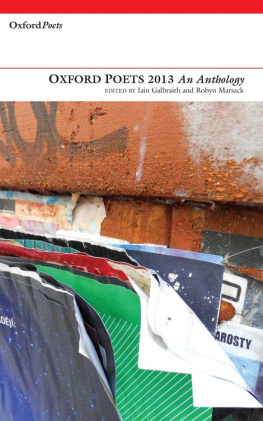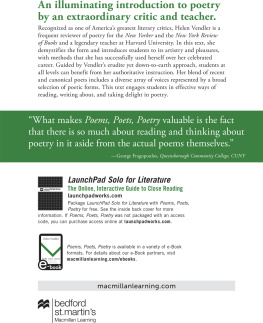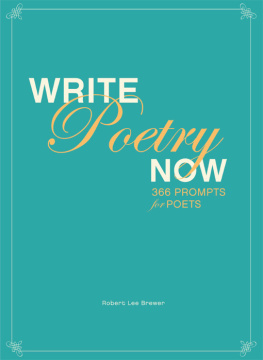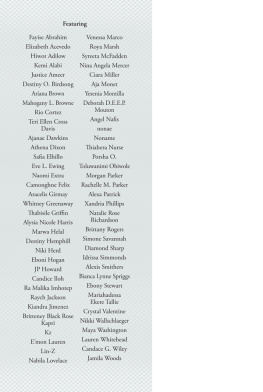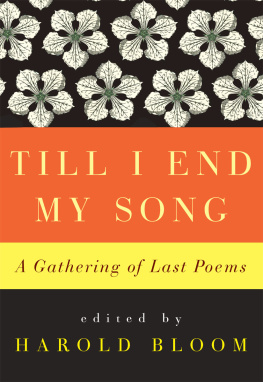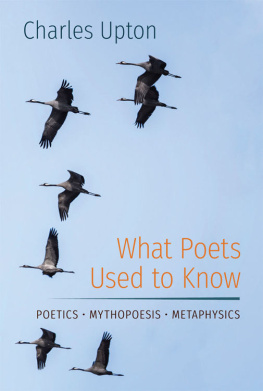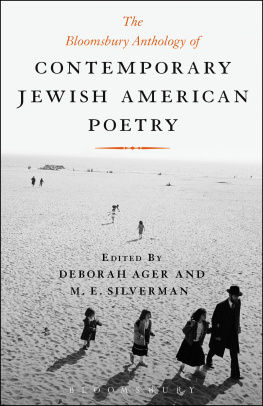This is the seventh Oxford Poets anthology since 2000, and our hope is that readers coming to an Oxford Poets anthology for the first time will feel inspired and heartened, as we have, by the passion and accomplishment of the work presented between its covers. Those who have enjoyed previous anthologies in the series will welcome the continued interrogation of the formal and thematic breadth in contemporary poetry, as well as the opportunity the present selection affords to discover new and compelling voices and explore some unfamiliar correspondences and perspectives . The format of the last anthology, in which the poets biography and a short statement by each poet reflecting on his or her work preceded a sizeable selection of poems, has proved attractive to many of our readers: there cannot be a better argument for retaining it here.
Oxford Poets 2013 also follows previous anthologies in its openness to poetrys many localities and provenances. Poetrys diversity and exuberant vision resist containment by categories such as nation, gender or region. The present volume, open to poets from different continents and cultures, provides the appropriate environment for a kind of writing to which memory, breathing, space and silence have traditionally meant more than national or even linguistic affiliation.
On receiving a copy of Rainer Maria Rilkes volume Vergers, collecting poems that he had written in French some of which we present here in Paul Batchelors graceful translations Marina Tsvetayeva expressed to their author her surprise that anybody should wish to reduce poetrys dimension to a national province or the confines of a single language: Writing poetry is itself translating, she wrote, Orpheus bursts nationality, or he extends it to such breadth and width that everyone (bygone and being) is included. While the work of a poet may bear the lifelong impress of a particular landscape, his or her reading is likely to see through borders. A poet living in Manchester, Mumbai, Basel or Adelaide probably will be as drawn to American, Spanish or Arabic poetry as to poetry written in his or her own region or dialect. Access to other poetries across economic, political or linguistic boundaries cannot be taken for granted, however, and this volume wishes to champion translation s service to the global republic of poetry. Moving beyond the paradigm of periphery and centre, Oxford Poets 2013 focuses neither on English poetry nor poetry in English, but assembles the work of nineteen poets from a dozen different countries, with translations from several languages: Finnish, German, Sanskrit, Russian, French, Hungarian, and Scottish Gaelic. The poems in this anthology associate by theme.
A common thread links the many types and meanings of migration: sojourns in foreign places, new beginnings, journeys through real or imagined landscapes, translations between languages, cultures, codes, dimensions, and systems. Another strand foregrounds the beguilements and betrayals of memory: the siftings and shifting of its layers, excavation and archaeology, personal and public histories and archives, (mis-)information and myth. Many of our authors investigate a heritage of stories or records, others put language itself at the centre of their work: language heard from outside, language on realitys cutting-room floor, language in realtime. Many find intricate forms for their poetry. More often than not, several such topoi are braided into one poets work, in the rich mix of a single poem. Gregor Addisons poems are like multi-dimensional maps where the local and the world meet.
Listening to family stories across the years is not only a way of locating himself, but a pointer to other lives, tragedies, roads not taken. Listening plays a central role in David Attwoolls work, too. His celebrations of music have a unique brio; aware of a beat far below deck, his voyages are propelled by the sound of cellos. His poems of family touch public history, and remembrance is a word he is not afraid to use. Family stories can often be hidden histories, fragile in their battles with repression and invaded privacy, and Christy Duckers abecedary sequence about the life of a reluctant celebrity finds a powerful and yet delicately respectful form to document her personal witness to the Grace Darling archive. Lyn Jenner confesses to being another storyteller, and her work like that of Emily Ballou, Toh Hsien Min, Vivek Narayanan and other poets here is untrammelled in its espousal of free forms.
She describes herself as a nerdy, archive-loving type in real life, but it is imagination rather than a library card that brings her to a remembering that will not be mere memory (Jean Amry) and longs to make a new poem from the few words which, by chance, have survived the flames. Jan Wagner is one of Germans most skilful contemporary poets; sonnets, sestinas, villanelles and Sapphic odes flow with ease from his hand. But his scintillating displays of classical form are balanced by surprise and transgression: poetrys bond with our steaming, glowing, odorous, noisy world. Paul Batchelors poems Brother Coal and Pit Ponies set out from a burning loyalty to class and family history, and yet writing them has brought him up against a productive paradox: poetry, he writes, wants all the loyalty for itself. Rilkes French poems are less well known than his German ones, and we are glad to have Paul Batchelors translations here. Translation, seeking its distance between the countenance of the source and the work-face of the new language, is always modernising, beginning, making it new, and Vivek Narayanans research-driven renewal of the Sanskrit Ramayana shows the poetics of a translation masterpiece in statu nascendi.
Who would be the archivist of last things, asks a poem by Emily Ballou; her generous, wide-ranging forms compose a score of human traffic, not forgetting the desert-inscribed glyphs and graffiti of her invented character Lizard. Peter Mackays work inhabits a trans-historical landscape, criss-crossed by journeys between the modern metropolis of his working life and the Lewis of his younger years, recouped in poetic sorties in a language whose names and nouns contain the scorings of different cultures: Norse, Gaelic, Scottish, Anglo-Saxon. The love of roaming mentioned in Andr Naffis-Sahelys N16 8EA has carried him to many distant places on the globe distant from where? His life studies, a form some of these poems suggest, are as likely to invoke Persian Tus or the experimental town of Auroville in Tamil Nadu as Londons Stoke Newington, and yet each poem worries at a local catastrophe. Karen McCarthy Woolfs Thirteen Names for the Moon sings the moons moods, finding a haunting voice for a passage from bereavement to poetic resolution. Journeys, especially sea voyages, as well as a seamans tales of foreign places, appeal to Ian Stephen, whose poems are full of tacks and booms, crossings and compass points, lending an existential urgency to landmarks. Night crossings and flight paths are central to the stepped forms of Toh Hsien Min, but the view from the port-hole does not always reveal reliable points of orientation: you can only see this / from a distance: / the fist of clouds, / those leakages of light, / twitching electricity.
Inventions negotiations with memory, as well as meetings and sightings, mark Kerrin P. Sharpes lyrical paths through a world without maps, while Leonie Rushforths tentative surveyings detail instructions for transit: writing a poem is usually a process of making my way somewhere I cant get to using normal navigational instruments like thought or conversation. Frances Levistons poetic dissection of disinformation would put the theodolite of the poem itself on trial along with that jar in Tennessee

